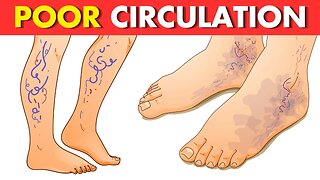Premium Only Content

What Eating Too Much Meat Can Do To Your Body
We recently talked about veganism and how people are changing their lifestyles and consuming less meat. Are you part of this statistic?
One of the reasons for cutting meat out of eating is the environment.
But, have you ever wondered what happens in your body when you eat too much meat?
Although meat is an important part of our diet, exaggerating its consumption can harm our health.
It is not to say that you should give up that delicious steak forever but, it is always good to know what too much meat does to your body.
Let's see in this video what happens when you eat too much meat.
Dehydrates the body: due to the excess of uric acid in meat, you will probably feel thirstier than usual.
Causes kidney stones: the overconsumption of animal proteins, rich in uric acid, can cause kidney stones because of dehydration.
Hinders intestinal transit: meat-based meals are rich in protein but poor in fiber, found in fruits, vegetables, and whole grains.
Causes headaches: dehydration is also responsible for causing headaches.
Harms the skin, nails, and hair: meat-based products rarely contain vitamin C, which plays a crucial role in forming collagen.
You get sicker: the saturated fats of red meat and processed meats don’t contain the antioxidants necessary to fight inflammations.
You feel more tired: meat is harder to process compared to fruits and vegetables.
To avoid these issues, eat a portion of meat the size of your hand in each meal.
Now tell us, have you ever considered giving up on meat?
0:00 Side effects of eating too much red meat
0:35 Dehydrates the body
0:47 Causes kidney stones
0:55 Hinders intestinal transit
1:12 Causes headaches
1:27 Harms the skin, nails, and hair
1:46 You get sicker
----------------------------------------
Facebook: https://bit.ly/38BWbw3
Pinterest: https://bit.ly/2Irvwa6
Disclaimer: The materials and the information contained on Natural Cures channel are provided for general and educational purposes only and do not constitute any legal, medical or other professional advice on any subject matter. These statements have not been evaluated by the FDA and are not intended to diagnose, treat or cure any disease. Always seek the advice of your physician or other qualified health provider prior to starting any new diet or treatment and with any questions you may have regarding a medical condition. If you have or suspect that you have a medical problem, promptly contact your health care provider.
-
 4:50
4:50
Natural Cures
1 year ago $1.29 earned5 Warning Signs of Poor Circulation and How to Fix It
4.27K3 -
 2:34
2:34
Natural Cures
3 years ago $0.01 earnedHere's What Sleeping After Eating Does To Your Body
35 -
 2:57:09
2:57:09
TimcastIRL
4 hours agoCorporate Press Refuses To Mention Minneapolis Shooter Was Trans | Timcast IRL
170K82 -
 LIVE
LIVE
Akademiks
4 hours agoWar in RAT-LANTA. Young Thug vs Gunna vs Ralo vs YSL MONDO. Who Will Le Bebe Pick. FINAL CRASHOUT!
1,916 watching -
 1:02:24
1:02:24
Man in America
7 hours agoThe Final Battle: Nanotech, Transhumanism & the War for Your Soul w/ Dr. Ed Group
29.5K2 -
 39:56
39:56
Sarah Westall
2 hours agoUpcoming World Wide Economic Collapse/Deep Recession & What the Big Money is Doing w/ Ed Dowd
21.6K3 -

Barry Cunningham
3 hours agoIT'S MOVIE NIGHT WITH BARRY!
34.5K21 -
 31:05
31:05
The Why Files
2 days agoPeru's Most Terrifying Mystery | The Face Peelers
40.3K41 -
 1:32
1:32
Gaming on Rumble
11 hours agoWhat is the Rumble Creator Program?!?! | Lvl UP
29.1K4 -
 1:50:49
1:50:49
Flyover Conservatives
23 hours ago9/11 on Steroids: What’s Coming This Fall? - Bo Polny | FOC Show
40.6K6